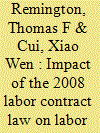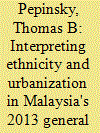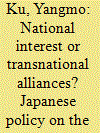|
|
|
Sort Order |
|
|
|
Items / Page
|
|
|
|
|
|
|
| Srl | Item |
| 1 |
ID:
140284


|
|
|
|
|
| Summary/Abstract |
In this article we examine the electoral impact of urbanization vis-à-vis ethnicity in Malaysia. We employ a robust econometric technique, the fractional response logit model, on data from the recently concluded thirteenth general election. The findings show that there are both an ethnic effect and an urban effect in determining the distribution of parliamentary seats among the political groups. Strong support for the opposition coalition, Pakatan Rakyat, was evident in urban constituencies, while the ruling coalition, Barisan Nasional, continued to enjoy success in rural constituencies. Although Barisan Nasional is still dependent on Bumiputera support, its success is also dependent on non-Bumiputera support from rural constituencies. However, with declining birthrates among the Chinese electorates, this support may not be forthcoming in future elections. We also provide insights for both coalitions to consider in developing strategies for the next election.
|
|
|
|
|
|
|
|
|
|
|
|
|
|
|
|
| 2 |
ID:
140288


|
|
|
|
|
| Summary/Abstract |
China's Labor Contract Law came into force on January 1, 2008. One of several important legislative acts aimed at improving the processing of labor grievances through mediation, arbitration, and litigation, and averting collective labor protest, it provides that all employed persons must work under written individual employment contracts. We evaluate the legislation's impact nationally and by province for the years before and after the law's adoption. Observing that the law's effect varied substantially across provinces, we estimate the effects of the law, controlling for time, development level, export intensity, and migrant labor share, on the volume of disputes by province using a cross-sectional time series design. We also examine the law's impact on the incidence of collective disputes and the grounds for disputes. We find that the law significantly increased the volume of labor disputes, raising questions about the relative costliness of the government's strategy for managing employment relations.
|
|
|
|
|
|
|
|
|
|
|
|
|
|
|
|
| 3 |
ID:
140285


|
|
|
|
|
| Summary/Abstract |
In this article I reinterpret Ng, Rangel, Vaithilingam, and Pillay's analysis in this issue of pro-BN voting in Peninsular Malaysia in Malaysia's 2013 general election. I show that the authors' statistical methods are inappropriate for testing whether district ethnicity predicts district-level BN vote share, and that their modeling choices result in tests of hypotheses that do not exist and cannot be derived from standard theoretical approaches to ethnic voting in Malaysia. I then provide a range of statistical evidence that supports three main conclusions: (1) ethnicity and district area (a proxy for urbanization) both predict BN vote shares at the district level, (2) neither the effect of ethnicity nor of district area can be reduced to the other, and (3) there is no interactive effect between ethnicity and urbanization. These results are in direct contradiction with the authors' results, and apply equally in Peninsular Malaysia and the entire country. I also discuss the broader issues that emerge when testing competing theories of BN vote share.
|
|
|
|
|
|
|
|
|
|
|
|
|
|
|
|
| 4 |
ID:
140287


|
|
|
|
|
| Summary/Abstract |
When and why does a perpetrator state take a contrite stance on its past wrongs? More specifically, why do Japanese behaviors differ over time in addressing apology and compensation with regard to the comfort women issue? In this article I address these questions by testing two hypotheses, utilizing an instrumentalist approach and a transnational-political activism model. The former posits a perpetrator state is more likely to take a contrite stance on its past misdeeds when it calculates such action is in its security and/or economic interests. The latter hypothesizes that when transnational activism is powerful and a perpetrator state is led by a progressive ruling coalition, the state is more likely to adopt conciliatory policies toward historical issues. I find that the transnational-political activism model possesses more explanatory power than instrumentalism for within-case variations in Japanese behavior toward the comfort women issue. The two approaches are not, however, mutually exclusive and are complementary in some regards. The effect of transnational activism is heightened when the target state is faced with other geopolitical incentives and/or when the target state is led by a progressive ruling coalition and has weak conservative reaction.
|
|
|
|
|
|
|
|
|
|
|
|
|
|
|
|
| 5 |
ID:
140286


|
|
|
|
|
| Summary/Abstract |
In this article we respond to Thomas Pepinsky's commentary on our article “2013 Malaysian Elections: Ethnic Politics or Urban Wave?” (both in this issue). We confirm that both ethnicity and urbanization play important roles in determining the incumbent ruling party's percentage vote share in the thirteenth general election. In doing so, we address the various econometric issues raised by Pepinsky and clearly explain the advantages of our econometric methodology vis-à-vis the OLS analysis espoused by Pepinsky. Our main results indicate that Barisan National's (BN) vote share from Bumiputera voters, regardless of urbanization levels of the parliamentary constituency, is below the 50 percent threshold. This result is surprisingly compensated by the more than 50 percent support for BN when Chinese voters are a small minority of the electorate. We also argue that Pepinsky's statement that Malay voters are predominantly rural voters is inaccurate and provide evidence to the contrary.
|
|
|
|
|
|
|
|
|
|
|
|
|
|
|
|
|
|
|
|
|